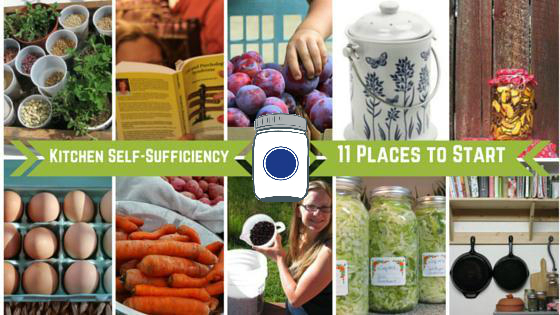
Some of us might jump into the middle of this list of kitchen self-sufficiency skills; some might have more to learn. I personally find I am overwhelmed with what I don’t know, but that once I have a plan to tackle something I can shake off the paralysis. If the light-bulb has come on over your head and you’re thinking “gak—I only have enough food in the fridge for 3 days,” start here.
When it comes to developing new self-sufficiency skills, we all have our faves and we all have the things we will never attempt again. This is the beauty of bartering! We love canning, dehydrating, and meat curing at our house…but since I have zero berry bushes on our property currently (thank you Montana wildlife), I’ll be trading my skills with friends who do! Rearrange my list for your own purposes, but first let me tell you where my list comes from:
- I’m a researcher. I over-read, over-ask, over-study every single thing I do.
- I’m an experimenter. If I get an idea in my head, well, I cannot rest until I have tried it myself; and many of them don’t work (don’t believe every pioneer trick, blog, or magazine article). I’m saving you time by helping you skip my mistakes.
- I’m frugal. Cheap. I have to be. Long story, but I have lived the life that dinner was what we dug out of the ground that morning, what we foraged, and what we bartered. Living that way changes you. If I am going to buy a kitchen tool, it has to do multiple jobs and pay for itself by saving me money in other ways.
- I’ve been producing, preparing, and preserving my own harvest for over eight years. I was a skill-learner before that, actually…but that is how long I have been walking the path towards self-sufficiency. I still consider myself a “newbie” in terms of years, and yet have become quite expert with many of these skills by sheer repetition. Did I ever tell you about the time I thought 6 boxes of peaches simultaneously was a good idea?
Make a plan. Put these on the calendar. Start here.
Plant something. Anything. You’ll probably kill it, but you must learn to work soil. Must. I don’t care if you had a garden growing up, that is not enough experience. You’ve moved and the soil is different, you’ve forgotten what you think you know, and you probably value different things than your parents might have (i.e., using “Roundup” seemed normal when I was a kid but I wouldn’t touch the stuff now). Gardening is for everyone at every age and every walk of life. Gardening connects you to the earth, to your neighbor, and to your own humanity. You can never, never, never appreciate what you shove into your greedy little mouth until your back hurts under that summer sun. Need some help? We’ve got some great books to get you started.
Invest in a Homesteading Library. Don’t think “Oh, I can just look that up online.” Some of my greatest ack moments have been when the internet wasn’t handy. Some of my greatest homesteading insecurities required the knowing words of a trusted author (like the first time I had to relieve the suffering of an animal in great pain). Let’s face it, you get distracted online anyway. You start out with the intention of reading up on…oh…let’s say “How to Build Your Own Greenhouse” but you went off on a rabbit trail somewhere and have little working knowledge by the time you move your stiff legs from your computer. I’ve mentioned this before, but reading the old classic “The Encyclopedia of Country Living” cover to cover changed my life. I’d actually recommend a book over that one these days—“Storey’s Basic Skills” is a must-have for your shelf. You can learn which self-sufficiency skills appeal to you and which ones do not. Read a little before bed, pour over sections before tackling a new project, and it keep it open on the workbench or counter as you work. You know that the information is time-tested, solid “how-to.”
Search for local food sources. This is likely going to be a time-consuming project, but it is perhaps the most rewarding, truly. You will develop relationships with farmers and artisans, and as an extension of those relationships you will further develop skills (how to deal with that hornet’s nest, how to clabber fresh milk, how to keep your chickens warm in the winter). You will deepen your understanding about the nature of self-sufficiency, and about what it means to be a good neighbor. You will get healthier on the fresh food, and you will save money too. We buy a pig every year and ¼ of a cow from the same great farmer, and we save over 25% grocery store pricing. You will prioritize something our culture long forgot—the value of caring about sustenance. By finding some local food sources, you also greatly minimize your risk of what a local disaster might do to your family. Here are some places to start—find your nearest farmer’s market, search for a local CSA, and ask your friends if they know of any! Get to know local gardeners through your library, county extension agency, or gardening club.
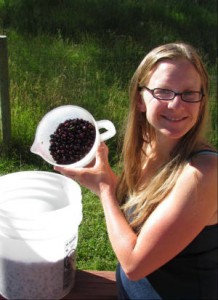 Seasonal Eating. This is where one skill begins to lead into another. Once you find local food sources, you will quickly discover the necessity of seasonal eating. Forget everything you ever knew about the 8th Grade Health Class Food Pyramid…it’s okay that you are eating a lot of asparagus when asparagus is in season, or a lot of tomatoes because that is what you have. It all works out in the end, granted everyone started out healthy and eats in moderation. With that said, though, there is a moment in time when you are DONE with what is in season! That brings us to the next one…
Seasonal Eating. This is where one skill begins to lead into another. Once you find local food sources, you will quickly discover the necessity of seasonal eating. Forget everything you ever knew about the 8th Grade Health Class Food Pyramid…it’s okay that you are eating a lot of asparagus when asparagus is in season, or a lot of tomatoes because that is what you have. It all works out in the end, granted everyone started out healthy and eats in moderation. With that said, though, there is a moment in time when you are DONE with what is in season! That brings us to the next one…
Dehydrate! Come January, you will be oh-so-thankful that you have home-dried apple rings to add to the oatmeal, that you have dehydrated celery to add to the soup, that you have delicious, homemade fruit leathers for a grab-and-go snack. I recommend this skill first over all over food preservation skills because:
- The equipment is a simple, 1-time purchase with a warranty.
- It’s fool proof. You aren’t going to “over-dehydrate” something. You get the greatest dehydrating book ever when you purchase the Excalibur that will walk you through every single food you could possibly dehydrate. You got this. You can do it.
- It’s ridiculous how much money that dehydrator will save you. No one ever gets to the entire stalk of celery before it starts going limp, no one ever has enough freezer space for that really great deal that they had to have on berries or broccoli or whatever. Forget adding extra deep freezes, you can store food for free once it is dehydrated. Forget throwing something away you didn’t get to in time; dehydrate it before it gets to that point and infinitely extend the shelf life.
Backyard Chickens. Yes, this is a commitment but you will so thank me for this. Many urban communities allow them now but please check with your township or city to make sure that you are in compliance; some allow a few hens but no roosters, etc. I recommend starting with a few hens but no rooster anyway. You will never know the trauma of cracking a fertilized egg over your brownie batter. You will just go greet your girls with breakfast in the morning, and send the four year old to collect some eggs in the afternoon. You will turn them loose in the remains of your autumn garden so that they get a special treat and you get a free fertilization treatment.
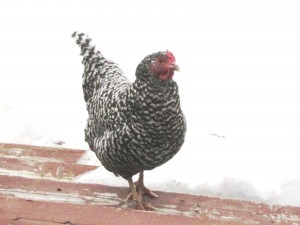
You will have an extraordinarily ecologically-friendly use for your kitchen scraps. You will think of them as pets, and they will earn their keep for you. You can have a farm fresh food as close as your back step. I think every kitchen should have at least 3 chickens, if it is at all possible! Sure, you’re going to want to build the Better Homes & Coops bachelorette pad, but refrain and use something cheap and homemade to start (get a great book to do it right) until you realize just how much you love backyard poultry! You’ll become the Crazy Chicken Lady and want to expand your operation, so don’t overspend when you start out.
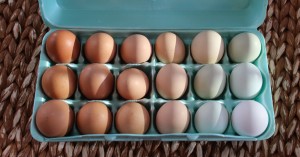
Compost. You were hoping I’d leave the whole gardening thing alone now, wurnt-cha? The only thing easier than killing something you tried planting (see #1) is turning refuse into deep, rich loam. And guess what? You turn your apple peels and dirty paper towels into deep, rich loam this year, and you’re less likely to kill what you plant next year! You’ve also just cut your trash bags in the dumpster down by half. This is too easy, too mindless to say no. It is the responsibility of every consumer– self-sufficiency minded or not—to recycle valuable nutrients back into the soil and to minimize waste.
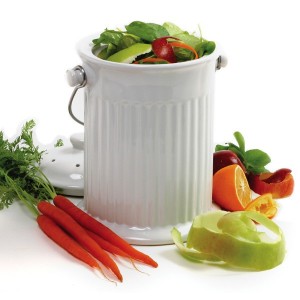
Find Your Kitchen. You will also rediscover things like health, taste, and staying within the grocery budget. Schedule a time every week to bake something. Make homemade granola bars (if it’s just you, you can always freeze some for a quick snack on the go). Make waffles, and freeze some for the toaster another day. Cook dinner. If you cannot do this every night, learn to make extra for food storage and always have a nourishing meal—even on those busy days.

Vacuum-sealing. If you learn to dehydrate and you begin cooking snacks and meals, this is the natural next thing on your checklist. It’s a serious money saver! Don’t lose dehydrated foods to moisture, don’t lose frozen foods to freezer burn. You can portion-size meals and snacks when you vacuum-seal, you can label everything very clearly, and you save a ton of space. Dehydrated, vacuum sealed foods can last up to a decade (depending upon the item) with very little nutrient loss at all. Next to the dehydrator, this is the best kitchen tool for saving money.
Homemade bone broth and vegetable broth. You were going to throw out the bones, but instead you have 2 quarts of nutrient dense broth—broth for which you determined the ingredients. If you haven’t recently read the back of purchased stock, take a minute and search your pantry right now. I’ll wait. Did you read a label? Okay now…making your own is as easy as pouring water over the bones in a pot and turning on a burner. Done. Vegetable broth is every bit as easy. Save money, cut out superfluous ingredients that can’t possibly be good for you, and reclaim a lost skill for zero money.
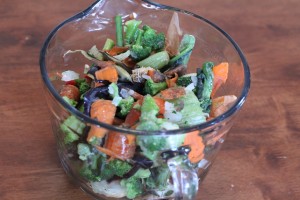
Ferment something. This is a big, wide world and people often get intimidated with where to start. Start small. Ask a friend for a set of water kefir grains or kombucha grains (people who have them often make it known, they are trying to offload their ever-growing collection). Just start with one thing. Don’t have access to those? A head of cabbage and a little salt will get you started nicely with homemade sauerkraut. I thought I hated sauerkraut before making it at home because—rest assured—it is NOTHING like the store-bought stuff. I promise. Fermenting will do a few things to increase your self-sufficiency: It jump-starts a healthy immune system, it can create a satisfying alternative to processed sodas, lemonade, and teas (saving you money again), and teaches you to overcome that modern sterilization myth; you will learn to work with nature to create healthy, living things. It may seem subtle but I think that this is a very important shift in thinking to improve other skills like gardening, bread baking, and animal husbandry. Nearly everything is symbiotic in some form or fashion—even the jar of grains on your kitchen counter. Just add water and a bit of sugar, and you will have a delicious homemade “soda” that keeps the doctor away, utilizes what you already own in the kitchen, and will give you the “I made that” satisfaction that comes with finding your kitchen again.
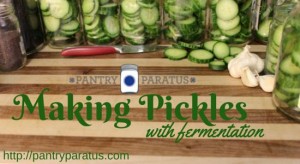
Ultimately, the list is way longer. You will graduate to canning and take a regrettable notion to try goats; you will fall in love with many other rewarding, enriching skills that all lead to a self-sufficient home. And many of you will be distressed that those didn’t make my 11 Places to Start. I hope, rather than being a definitive list, that this is just the jumping off point for you. Start here, fall in love with the lifestyle, and keep learning.
–Chaya

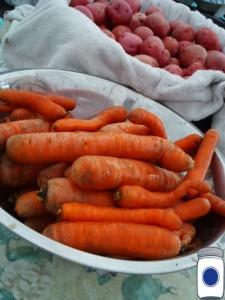
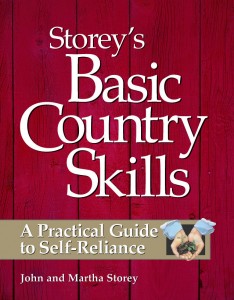
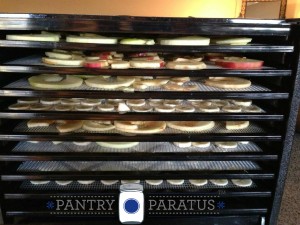
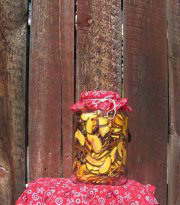
i’m working on even finding my kitchen! 😀
found the kitchen, done some sprouting, making bread, yogurt, trying some cooking of meals, receiving a csa share since of june, learning to water bath, pressure can, 9 tray excalibur ain’t big enough, thankful for vehicle dashboards, vacuum sealer to help preserve the harvest as well as some meals i made, making mistakes what a understatement, oh was trying to start a garden but rent association tyrant shut me down,definitely would not like the chicken idea, sorry about the rant. love bob
Thanks! It’s such an encouragement to hear everyone check in and say what is or is not working for them. We all have our preferences on the skills we do enjoy and the ones that we do not find rewarding personally. I am so saddened to hear that your attempts at gardening are shut down by others! So wrong! Do you know that on a recent vacation, we discovered that Fenway Park (Boston’s home to the Red Sox) now has rooftop gardens that supply their restaurants? I’m hoping that over time, more awareness will come to everyone about the many benefits. Keep moving forward, and check in with us from time to time!